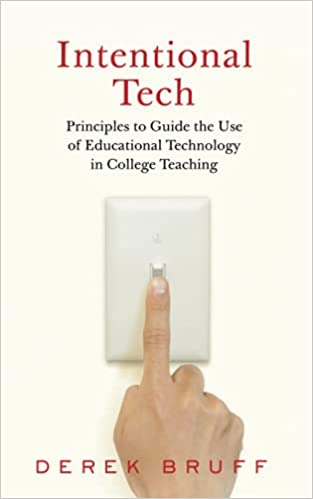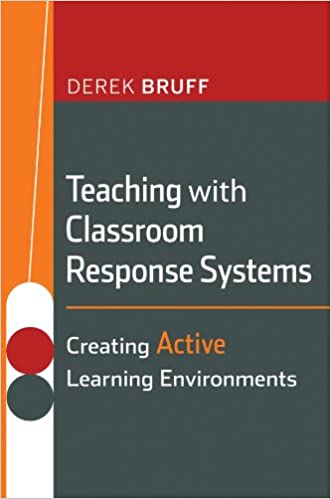Author and expert on teaching, learning, and technology
“Dr. Bruff’s presentation was clear, compelling and perfectly tailored to resonate with our Speaker Series audience. His examples were original, timely and effectively presented (cognitively and visually).”
—Janet Rankin, Ph.D., Director – Teaching + Learning Lab @MIT
Derek Bruff is an educator, author, and higher ed consultant. He directed the Vanderbilt University Center for Teaching for more than a decade, where he helped faculty and other instructors develop foundational teaching skills and explore new ideas in teaching. Bruff consults regularly with faculty and administrators across higher education on issues of teaching, learning, and faculty development, and he provides practical advice for educators through his Intentional Teaching podcast. Bruff is currently an associate director at the Center for Teaching Excellence at the University of Virginia, working remotely from his home outside Nashville.
Bruff is a sought-after keynote speaker who leads teaching workshops for higher education faculty and staff, drawing on his teaching and his educational development experience. Frequent topics include educational technology, AI and teaching, active learning, online and hybrid teaching, and the “students as producers” approach to assignment and course design. He models strategies for student engagement in his interactive keynotes, hands-on workshops, and virtual presentations.
Bruff’s first book, Teaching with Classroom Response Systems: Creating Active Learning Environments, offers concrete teaching strategies for instructors interested in using “clickers” and other live polling tools in their on-site or online teaching. Bruff’s second book, Intentional Tech: Principles to Guide the Use of Educational Technology in College Teaching, provides seven research-based teaching principles for incorporating technology in college and university teaching, along with many stories of faculty teaching with technology to provide ideas and inspiration to readers. The Norton Guide to AI-Aware Teaching, which he is co-authoring with Annette Vee and Marc Watkins, will equip instructors with practical strategies for teaching effectively in the age of AI, whether the instructors is embracing AI, resisting it, or somewhere in between.
Bruff has a Ph.D. in mathematics from Vanderbilt University, and he has taught a variety of undergraduate and graduate level mathematics courses at Vanderbilt and Harvard University, including calculus, statistics, linear algebra, and a first-year writing seminar in cryptography. Bruff’s classroom teaching experience both informs and is informed by his educational development work. He often draws on his own teaching experience when consulting with faculty and leading workshops, and his teaching allows him to put into practice recommendations from the scholarship of teaching and learning.
Praise for Derek’s Presentations
“In spring of this past year, Derek gave a wonderful workshop about ChatGPT, pointing away from a reactionary approach rooted in suspicion and toward the fundamental pedagogical practices that can help educators navigate this new landscape. Our audience of faculty, graduate students, and postdoctoral scholars appreciated the way that he made space for their concerns, values, and priorities within an engaging event structure, weaving together a meaningful conversation on a difficult and as-of-yet still unfolding issue. He was also willing to meet with our graduate teaching fellows for an unstructured meet-and-greet, during which they enthused over shared pedagogical passions and delved eagerly into complex conversations around the politics and economics of higher education. At both events, and over the course of a single day, Derek showed his mastery of fostering a community of practice around teaching, and attendees left with new information and a sense of shared purpose.”
—Gina M. Hurley, Ph.D.,
Associate Director, Graduate and Postdoctoral Teaching Development
Yale Poorvu Center for Teaching and Learning
“Derek was the right speaker at the right time for our faculty. As all of higher education works to address Generative Artificial Intelligence, he was able to engage faculty in thinking about not only the current state of AI and what it means to syllabi and assignments, but also what the future might hold for these technologies. His blend of discussion, active learning, and live polling engaged faculty at all levels of comfort throughout his talk.”
—Ed Finn, EdD, Director of Instructional Technology, Design, and Assessment
Center for Innovation in Teaching, Assessment, and Learning
Valparaiso University
“Derek’s warm and engaging persona combined with his vast experience and research-based insights makes him an ideal speaker for any faculty development-focused event.”
—Washington University
“Derek is very skilled in his field of practice and have helped attendees understand more on how to integrate technology in the field of delivering classes. He speaks from his experiences and uses concrete examples of the principles he shared which gave attendees a clearer understanding and ideas to implement in their own fields. Derek is inspiring other educators to become earlier adopters of new technologies for their classes which can result in a trickle-down effect to his students to become teaching innovators on effective learning tools in the future.”
—Yassin Rashid,
Market Development Analyst, Wiley
“Dr. Bruff’s talk was an absolute highlight of our program, captivating our faculty members while offering an all-round awareness of the burgeoning topic about which he spoke. The engaging talk showcased his expertise and profound insights about the subject.”
—King Fahd University of Petroleum and Minerals
“Derek provided an expert balance of engagement, content, and processing. This was practical, thought-stimulating, and engaging.”
–Scott Hamm, Assistant Director, Adams Center for Teaching & Learning,
Abilene Christian University
“We recently had the pleasure of hosting Dr. Derek Bruff for a webinar focused on the integration of artificial intelligence in the classroom. Dr. Bruff delivered an insightful overview of AI, shedding light on the intricacies of adaptive AI, and provided actionable suggestions for faculty implementation in the classroom. His ability to simplify complex concepts and engage a diverse audience is commendable. Our faculty left the session feeling informed, inspired, and ready to approach the use of AI in the classroom from a new and better informed perspective.”
—Chris Treadway, Ed.D., Vice Chancellor
West Virginia Community and Technical College Education
“Derek’s expertise and engaging presentation style left a lasting impression on our audience at Edmonds College. His knowledge and passion for the subject matter were evident, and he exceeded our expectations. We highly recommend Derek for future speaking engagements and believe his insights would be valuable for any audience.”
—Edmonds College
Praise for Intentional Tech
“Derek Bruff is an engaging—and often charming—guide throughout this concise book. The stories he tells keep things moving at a crisp pace and offer pedagogical inspiration. His principles provide a useful framework and establish a clear foundation for his practical advice.”
—Peter Felten, coauthor of The Undergraduate Experience:
Focusing Institutions on What Matters Most
Praise for Teaching with Classroom Response Systems
“A must-read for anyone interested in interactive teaching and the use of clickers. This book draws on the experiences of countless instructors across a wide range of disciplines to provide both novice and experienced teachers with practical advice on how to make classes more fun and more effective.”
—Eric Mazur, Balkanski Professor of Physics and Applied Physics,
Harvard University, and author, Peer Instruction: A User’s Manual




